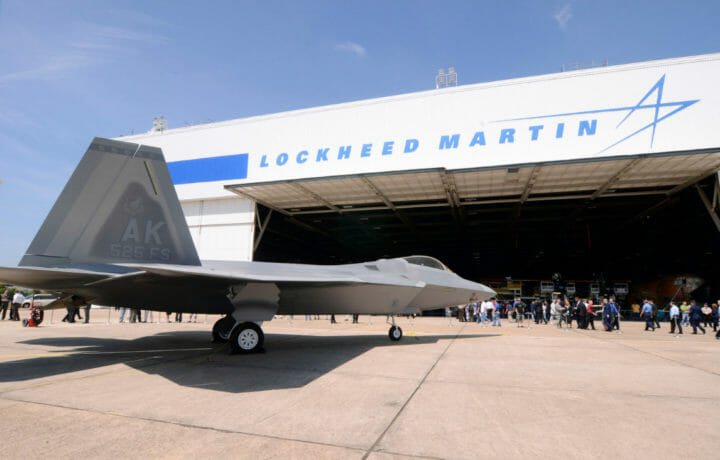Lockheed Martin (LMT) recently reported strong fourth-quarter financial results and provided encouraging full-year guidance. Moreover, the company is well-positioned to benefit from likely, continued high defense spending by the U.S. and many of its allies, while the stock’s valuation is quite attractive.
Still, the company is facing a number of significant challenges over the medium-to-long term. Additionally, with the wars in Ukraine and Gaza looking set to potentially wind down in the next several months, investors may want to wait before buying LMT stock.
Strong Q1 Earnings and Bullish Forecast
LMT’s sales climbed 4% in Q1 versus the same period a year earlier to $18 billion, while its earnings per share increased to $7.28 versus $6.39 in Q1 of 2024.
On the guidance front, the defense giant predicted that its EPS would rise to $27–$27.30 in 2025, versus $22.31 in 2024. LMT also projected that its revenue would come in at $73.75 billion to $74.75 billion, compared with $71 billion in 2024.
Speaking on LMT’s earnings call, held on April 23, CEO James Taiclet noted that the firm was benefiting from powerful demand for its missiles. More specifically, the number of orders for its “precision strike missiles, THAAD, and other tactical systems” has risen meaningfully. Additionally, the demand from U.S. allies for its F-35 aircraft remains strong, the CEO reported.
Global Defense Budgets: A Powerful Tailwind
Morgan Stanley, which upgraded LMT to Overweight from Equal Weight in the wake of the company’s results, expects the firm to benefit from an increase in the annual U.S. defense budget to $1 trillion. Further, the company should get a significant lift from Defense Secretary Pete Hegseth’s prioritization of missile defense and space programs.
And with many U.S. allies facing major threats from China, Russia, and Iran, their defense spending should continue to be high in the coming quarters and years. Providing evidence for this point, the State Department recently approved a deal that can enable LMT to obtain as much as $5.6 billion from the Philippines for 20 of its jets and other equipment, and last June, Israel agreed to pay $3 billion for 25 of LMT’s F-35 fighter jets.
LMT Stock Looks Cheap—Here’s Why
The company’s stock fell 6% in the three months that ended on April 25, and its current forward price-to-earnings ratio is a rather low 17. What’s more, Morgan Stanley reported that the shares’ valuation is 10% below the average level of the Defense Prime group.
And while worries about tariffs have likely played a significant role in the shares’ weakness, the investment bank reported that the company is actually “mostly insulated” from tariffs.
Risks on the Horizon: Competitors and Conflict Resolutions
A number of foreign countries, including Germany and Canada, are reportedly reviewing their previous decisions to purchase LMT’s F-35s.
Meanwhile, Boeing (BA) surpassed LMT in the companies’ competition to build America’s main, next-generation fighter jet. Over the longer term, this key loss by LMT could possibly weaken its financial results.
However, the Trump administration appears to be ready to lower its tariffs and negotiate new trade deals with foreign countries. The latter moves should prevent America’s allies from cancelling a significant number of their orders for the F-35, which is widely seen as the world’s best stealth fighter jet.
And Taiclet, LMT’s CEO, plans to greatly increase the technological capabilities of the F-35 while “potentially” keeping its cost 50% lower than the next-generation plane that it had planned to build for the Pentagon. The latter initiative should entice Washington and its allies to buy many more F-35s over the longer term.
Could De-Escalating Wars Cool Demand?
Finally, in the next few months, the intensity of the wars in Ukraine and Gaza could very well drop greatly or the conflicts could even end altogether. Ukraine and Russia both agreed to limited ceasefires, and Trump recently said, “I think we have a (peace) deal with both” Ukraine and Russia.
As far as the war in Gaza, The Wall Street Journal on April 16 reported that Hamas is having trouble paying its fighters. Consequently, the organization may soon have to agree to make major concessions to Israel in exchange for the latter nation ending the conflict.
If one or both of these conflicts end, LMT stock could drop meaningfully. Consequently, investors may want to refrain from buying the company’s stock for now.
Long-Term Opportunity for Value Investors
On the other hand, over the long term, the company’s strong, positive catalysts should propel its stock much higher, so investors with a time horizon of over two years could consider buying the shares now.
Given LMT’s huge size and low valuation, the shares are best suited for conservative investors and value investors.
*This article is intended to be informational only; it is not financial advice.




